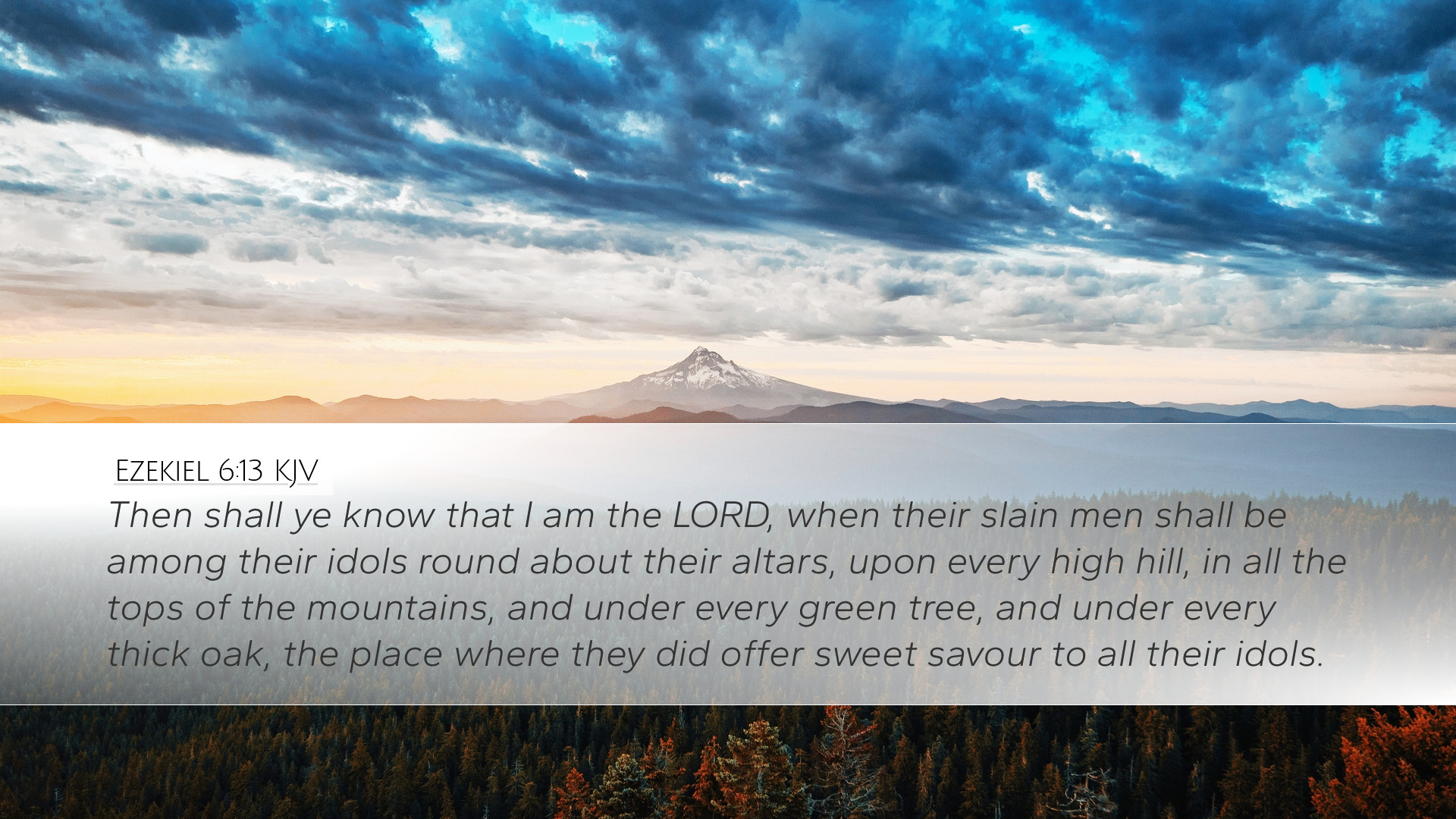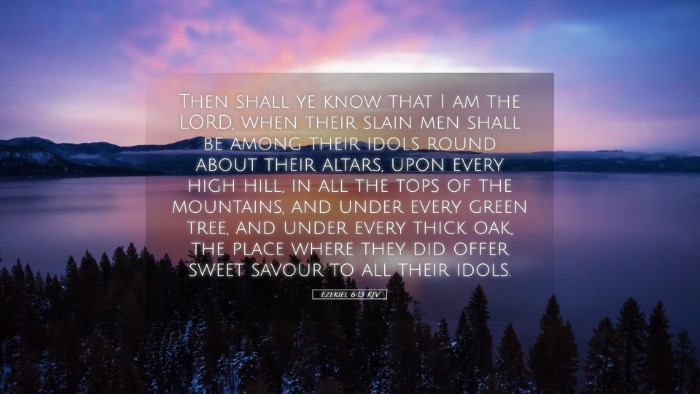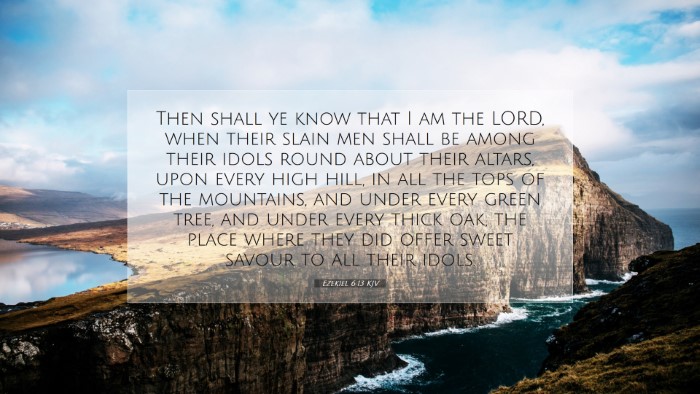Ezekiel 6:13 Commentary
Verse Text: "Then shall ye know that I am the LORD, when their slain men shall be among their idols round about their altars, upon every high hill, in all the tops of the mountains, and under every green tree, and under every thick oak, the place where they did offer sweet savour to all their idols."
Introduction
The prophetic vision presented in Ezekiel 6:13 serves as a poignant reminder of the consequences of idolatry and the ultimate sovereignty of God. This verse encapsulates the terrible fate awaiting those who turn away from the true God to worship idols. The significance of this passage is magnified through the insights of notable public domain commentaries, which unpack its theological depth and practical implications.
Thematic Overview
The central themes present in this verse include:
- The acknowledgment of God's sovereignty.
- The futility of idol worship.
- The ultimate recognition of God's authority following judgment.
God’s Sovereignty
Matthew Henry emphasizes that the acknowledgment of God's presence and authority comes often through the experience of His judgment against sin. In this verse, God's assertion, "I am the LORD," serves as a pivotal declaration that affirms His dominance over all creation. His sovereignty is not only recognized in times of blessing but even more so in moments of judgment.
Idolatry and Its Consequences
Albert Barnes points out that the “slain men” refers to the consequences of idolatry—death, destruction, and spiritual decay. The verse paints a stark picture of the futility of idols, as those who worship them will ultimately face the repercussions of their choices. The idols that consumed the people's affections will not deliver them when God's judgment falls. This verse serves as a sobering warning to all who turn to false gods.
The Setting of Judgment
Further exploration from Adam Clarke highlights the geographical references in the verse: high hills, mountain tops, and green trees represent places of idolatrous worship. The widespread nature of these altars signifies a society deeply entrenched in polytheism. Clarke emphasizes that God's judgment will manifest in every corner of their idolatry, a reminder that no one can hide from divine accountability.
Theological Insights
From a theological perspective, Ezekiel 6:13 serves to reinforce several key doctrines:
- The Nature of God: The mention of God’s name underscores His unchanging nature. He is the one true God, distinct from the false gods the people worship.
- The Reality of Sin: The acknowledgment of slain men among idols portrays the destructive nature of sin, leading to death and separation from God.
- Divine Judgment: God's warning of judgment reveals His holiness and righteousness, compelling believers to examine their own hearts regarding fidelity to Him.
The Nature of God
Henry illustrates that knowing God as “LORD” involves recognizing His power and authority. The events that lead to this realization serve as a testament to His holiness and a warning to His people. It is not merely knowledge but experiential understanding that emerges from trials and tribulations.
The Impact of Idolatry
Barnes explains that the “sweet savour” offered to idols is a direct affront to God, as it denotes worship due only to the Creator. This improper worship invites God’s wrath, as it embodies disobedience and rebellion. The graphic depiction of slain men amid their false gods reinforces the seriousness of turning away from divine worship.
Call to Repentance
Clarke urges that this verse should evoke a serious self-examination among believers today. The call for recognition that "I am the LORD" invites repentance and a return to God, aligning oneself with His purposes rather than the idols of modernity, such as pleasure, materialism, or power.
Practical Application
For pastors, students, and theologians, Ezekiel 6:13 offers rich soil for reflection and application:
- Assessment of Worship: Consider what or who holds the place of highest significance in one’s life. Are there modern 'idols' that divert attention from God?
- Communication of Judgment: There is a pressing need to communicate the reality of God’s judgment upon sin and idolatry within contemporary sermons and teachings.
- Encouragement for Repentance: Providing avenues for individuals to recognize their need for repentance and to seek restoration with God should be a pastoral priority.
Assessment of Worship
Henry’s insights encourage believers to evaluate who or what they actually worship. What activities consume our time and energy? Whom do we seek to please? The need is to affirm God’s rightful place in our hearts and worship.
Communication of Judgment
Barnes notes that an understanding of God’s judgment can lead to a comprehensive worldview where believers recognize the seriousness of sin. It is vital that this truth is communicated in a loving but clear manner to a world deeply entrenched in idolatry.
Encouragement for Repentance
The call to repentance echoes throughout Scripture, and Clarke highlights that acknowledging our failings before God is essential for restoration. Pastors should usher their congregations toward recognizing their idols and calling for a return to sincere worship of God.
Conclusion
As we reflect on Ezekiel 6:13, the message is clear: God desires recognition, not merely as a concept but as a transformative relationship. The consequences of idolatry lie in stark contrast to the goodness of God. Thus, let this verse provoke us towards a deeper commitment to worship the one true God, yielding our lives entirely to Him in light of His sovereign authority and grace.


